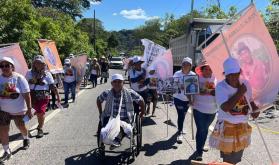Behind Military Barricades Lie Community Dissatisfaction and Political Persecution
Starting on December 11 and for several weeks after, residents in the city of Soyapango, one the most densely populated municipalities just outside of El Salvador’s capital, awoke to military and police patrolling the entrances into and exits out of Soyapango and all neighborhoods throughout. Military and police subjected residents to random searches of their personal belongings on the street, including cell phones, as well as home raids, profiling, and in some cases arbitrary arrests that have led to indefinite detention.
Though the Bukele administration has carried out military sieges of entire communities before and throughout the State of Exception, under which fundamental constitutional rights have been suspended since March 2022, he is marketing the “cercos militares” or military barricades as installed in Soyapango as the latest phase of its “Territorial Control Plan” he name given to an opaque security plan ostensibly intended to address gang violence, which has escalated into an open “War Against Gangs.” However, neither their use, nor the clear indication of political motivations that lie behind their implementation, are anything new.
Bukele’s tweet announcing the deployment of 10,000 soldiers into Soyapango circulated widely in international headlines, echoing the administration’s messaging, often megalomaniac in nature (making claims about being the best in the world), word for word, most often without much investigation into the veracity of the president’s claims or deeper understanding of the on-the-ground realities behind it. Context is often missing in coverage of these military sieges, which resemble previous deployments during Bukele’s hyper-militarized COVID-19 response in 2020 and throughout the now indefinite State of Exception, along with the many indications of these military barricades being used to fulfill the administration’s political interests.
Rather than their stated goals of safety and security, social movement and civil society groups have denounced the military barricades as another tool to silence dissent and criminalize community organizing and political opposition. Soyapango has been the site of long-standing conflict and protests from unionized municipal workers who are fighting back against unjust firings and unpaid wages. After denouncing threats, they had received that the State of Exception measures would be applied against them in retaliation for work stoppages and boycotts to demand overdue payment of December wages and year-end bonuses, two union leaders were, in fact, arrested.
Since mid-December, the government has similarly carried on into several other towns. While the Soyapango barricade has been reduced and concentrated in the Las Margaritas community, the military moved on to barricade the Tutunichapa, La Granjita, and San Antonio Abad communities of San Salvador on Christmas Eve.
Weeks later in the barricaded community of San Antonio Abad, on January 24, the military and police raided the home of Daniel Salazar, a youth leader in the Association for the Integral Development of San Salvador Youth (ADIJUSS), a member organization of the Popular Resistance and Rebellion Bloque (BRP), and of the Farabundo Martí Youth of the municipality of San Salvador. the Although Salazar was not home during the raid, his mother and sister reported being physically assaulted by the officers as well as hearing politically motivated threats. They reported that the officers claimed that, since the family had been members of the guerilla forces during the civil war, they would carry out murders if there were a future war, and photographed political symbols like FMLN and BRP banners inside the family’s home.
In their statement denouncing the raid, the Popular Resistance and Rebellion Bloc expressed the following concerns:
“It is [...] noteworthy that of the houses in this block only this one was raided in this way and with such violence.
We strongly denounce this aggression against the family of our comrade who has a longstanding demonstrated commitment to building a society with justice and freedom. We also condemn the police and military harassment in the San Antonio Abad community where, under the guise of a supposed fight against organized crime, they end up harassing and intimidating community leaders for their way of thinking.
It is increasingly clear that short-term militarization is intended to persecute community leaders, human rights defenders and organized youth who struggle every day to build a better country.”
Despite significantly high approval reported for the Bukele administration and his “War Against Gangs,” over a month into the latest phase of the Territorial Control Plan, human rights groups have expressed concern over its disproportionate impact on low-income sectors, particularly small business-owners, a trend that has been widely denounced since the beginning of the now-indefinite State of Exception.
Expressions of discontent amongst impacted communities are also common. CRISTOSAL, a Central America human rights organization headquartered in El Salvador, surveyed residents of Soyapango about living under these military barricades and found growing unease among the impacted community and growing disapproval of the use of military barricades. Residents reported being detained while walking on public roads or on public or private transport. Several respondents also reported that police and military officers had stopped and searched them violently. 64.7 percent of respondents thought that the government should use other measures to solve the problem of insecurity and violence, other than restricting people's freedom of movement.
Beyond the communities under military barricade, denouncements of militarized policing, arbitrary detentions, and widespread torture and violent deaths inside El Salvador’s prisons have been central rallying cries during recent mass mobilizations and have prompted the emergence of community groups organized by family members of those who have been arbitrarily arrested under the State of Exception, such as MOVIR, Movimiento de Victimas del Regimen.

 "I am a CISPES supporter because continuing to fight for social justice and a more people-centered country means continuing the dream and sacrifice of thousands of my fellow Salvadorans who died for that vision.” - Padre Carlos, New York City
"I am a CISPES supporter because continuing to fight for social justice and a more people-centered country means continuing the dream and sacrifice of thousands of my fellow Salvadorans who died for that vision.” - Padre Carlos, New York City

